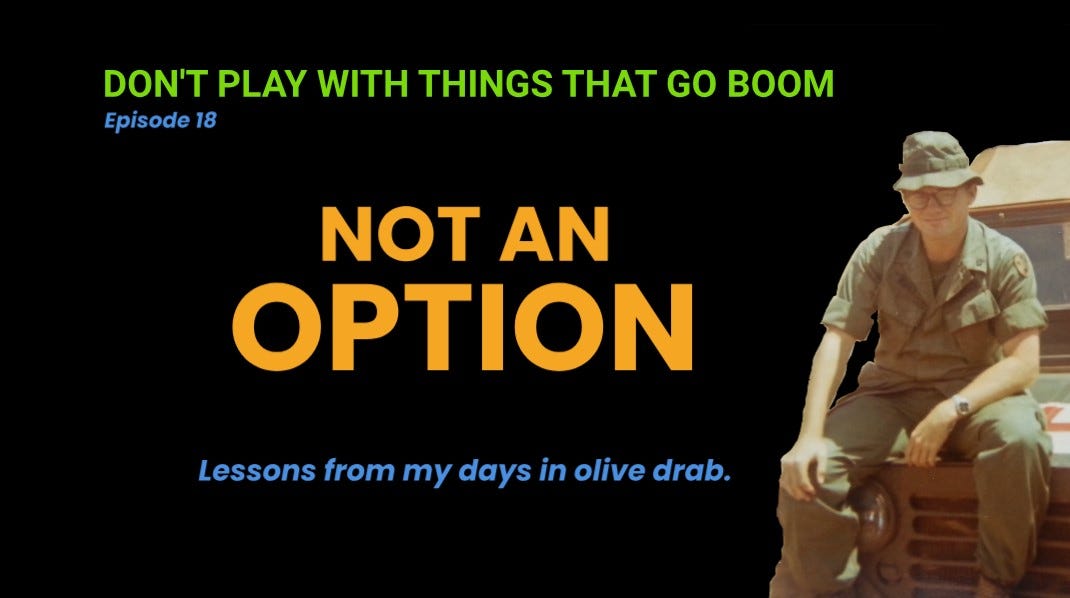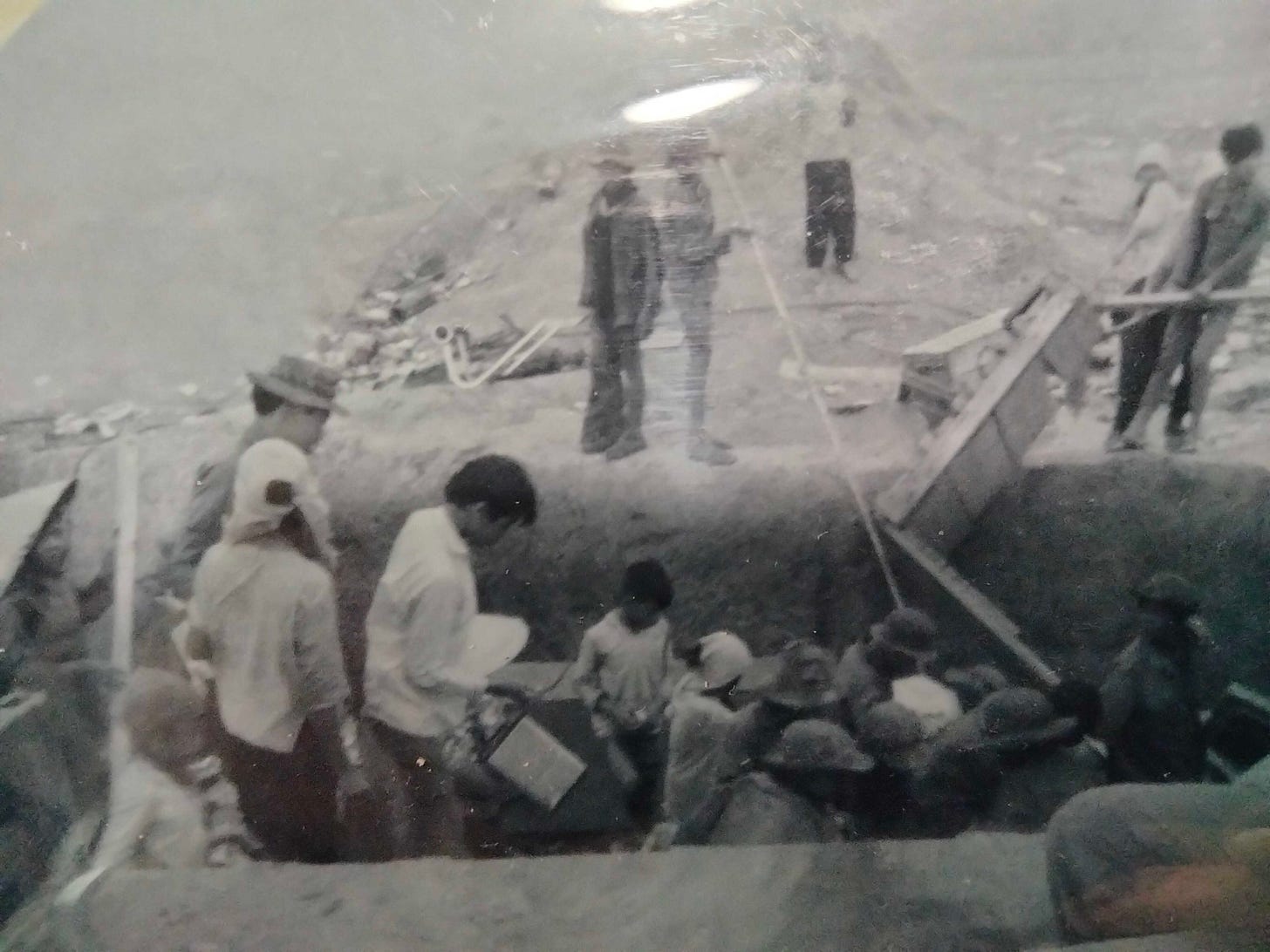PODCAST “Don’t Play With Things That Go Boom”
Click on the audio player above to hear the podcast or read the transcript below.
Episode 18 “Not An Option”
transcript
The Decision
I made the decision.
Killing innocent civilians intentionally, even in a time of war, was murder. Murder was not an option for a Christian.
The problem was … what do I do next?
Do I write a letter? Do I sit down and refuse to do my job? Do I try to hide?
I figured I needed to tell the guy in charge.
On the firebase, that was our Executive Officer, the 1st Lieutenant
But what if he wasn’t kind and reaffirming?
What’s going to happen to me?
I remembered how the South Korean troops were treated on a different firebase, but I was pretty confident that wouldn’t happen to me. I couldn’t imagine being called before the rest of the soldiers in our unit and beaten to a bloody pulp to show the officer’s displeasure of my decision.
I also was pretty sure some officer wasn’t going to come over and shoot me for not obeying an order.
Those were the easy options to set off to the side.
But there could still be some really unpleasant consequences.
I could be given a dishonorable discharge and sent home in disgrace. That wasn’t a pleasant thought, but I didn’t think that would happen. If soldiers were allowed to leave the battlefield just by saying “I quit,” the American Army in Vietnam wouldn’t last very long.
I thought it was more likely that I would be put on trial, courts martialed, and sentenced to prison. That seemed like the most likely option for me.
In fact, I remembered an old newspaper story I read that occurred during World War I. When war was declared, an Army officer, a captain I believe, submitted his resignation to the Army. He indicated that his family was from Germany and if he went to Europe to fight, he might be trying to kill his own family members, and he didn’t feel he could do that.
I felt sorry for the guy, but the court apparently didn’t. They sentenced him to 20 years in prison.
That was definitely an unpleasant result for him, but one that I thought was also a real possibility for me.
I had asked God for wisdom about what I should do, and believe He gave me an answer.
What would happen to me as a result of saying I was not going to continue shooting at unarmed civilians was not in my control.
The 1st Lieutenant
I walked over to the bunker that housed the command center for our battery. The man in charge was the 1st Lieutenant. Our Captain was actually in charge, but he seldom came out to the firebase, so I needed to talk to the next in command — our Executive Officer. The 1st Lieutenant.
I did not expect it to be a pleasant meeting.
I politely asked to speak with him, and he was very friendly and told me to go ahead. I explained what had been happening regarding some of our fire missions being directed at civilian farmers.
He didn’t respond, so I continued. I told him that, as a Christian, I could not keep doing my job at the fire control center if we were firing on civilians.
I don’t think this particular situation was covered when he went through Officer’s Candidate School, because he didn’t respond right away.
So, I explained again, as clearly as I could, that I would no longer take part in firing at unarmed civilians.
The 1st Lieutenant didn’t yell at me. He didn’t throw anything at me. He didn’t try to talk me out of my decision.
He told me simply to get all my stuff together and I would be sent back on the next chopper to Hawk Hill, where the captain would deal with me.
It didn’t take long to pack. Everything went into my duffle bag, and I waited for the next helicopter to arrive on the hill.
So far, things went much better than I had expected.
The Captain
I arrived on Hawk Hill, took my duffle bag to the area where the cots were for soldiers coming and going. Then I headed to the headquarters building for the 3/82 Artillery.
It was a nice building. Having spent a few months on firebases, it didn’t take much to consider a building “nice.” There was a main reception area, manned by a sergeant at a desk. I introduced myself and the sergeant knew about me and said the captain would see me shortly.
I waited to be called into the captain’s office.
The captain also had a “nice” office. The Army has a way for an enlisted man to introduce himself to an officer, and I made sure I did it correctly. The captain motioned for me to sit down and asked me to explain what was going on.
I went through the explanation again, describing what had happened and how, as a Christian, I could not continue to fire artillery shells on civilians. I would not continue to fire on civilians.
The captain had a different approach than the 1st Lieutenant.
He didn’t throw anything at me, but he did raise his voice and tried to make his point very clearly … bordering on the line of yelling. He made it clear that not doing my job was not an option for me.
If I refused to do my assigned duties, he explained, I would suffer very severe consequences. Those consequences could include courts martial or even prison.
I said I understood and tried to explain clearly again what the Bible told me about not killing others. I included a little history lesson of people who used the excuse they were just following orders when they were being tried for war crimes.
I don’t know if he didn’t like my Bible lesson or my History lesson or both.
He was a very unhappy commanding officer, and he wanted me to know that.
He told me I would have to fill out the paperwork requesting Conscience Objector status, but he said there was no way I would get it. He explained that the Arny never give out the CO designation to someone who is in the service. The CO status has to be claimed before the person enters the Army.
I said I understood, but I was not asking to become a conscientious objector. I had volunteered for the draft. I believed in our fight. I was not a conscientious objector. I just couldn’t kill innocent civilians.
That didn’t make him happy. He told me to leave his office and see the sergeant.
I left. And yes, there is an Army way to leave a superior officer, and I made a point of doing it correctly.
Am I a Conscientious Objector???
The sergeant was waiting for me.
He handed me a manual that explained how to submit the Conscience Objector request. Not that it mattered, I told him that I was not a conscience objector. He said he didn’t care and told me to do what the manual said.
I said I would.
Then he told me to turn in my weapon.
What?
I’m in a war zone. I need my M-16.
He said conscience objectors don’t carry M-16’s.
I started to explain that I wasn’t a … but I realized it wouldn’t make any difference, so I just said I would.
I turned in my rifle, and now I was without a weapon in Vietnam.
Writing the Request
I read through the Army manual on how to fill out the conscientious objector request and started writing.
There were no word processors in existence back then, and I didn’t even have access to a typewriter.
Everything was handwritten, so I wrote and rewrote, and rewrote, until I got it just right.
I described in detail what I had seen, trying to be as accurate as possible. I explained that I thought the actions I had seen were war crimes and even went into the history of war crimes.
I explained my Christian position, giving verses from the Bible to back up what I was saying.
Finally, I wrote a nice clean copy and took it to the sergeant in the captain’s office.
Is there something wrong with me?
I thought that was it, but I was wrong.
Part of the process of requesting to become a conscientious objector included being interviewed by some experts. The experts were then to submit reports that would be added to my request.
I was sent to a medical doctor and had a brief interview. I’m not sure what the purpose of that interview was, but the doctor was very nice, and the meeting didn’t take long.
Then I was sent to the chaplain. I assume this was to evaluate if I had a real “religious” concern. I shared with the chaplain what I believed the Bible taught. He didn’t try to talk me out of anything but just listened. He was also a pleasant man.
Then I was loaded on a truck and driven to Chu Lai to be interviewed by the Division Psychiatrist. I assume that was to determine if I was crazy. I don’t remember what we actually talked about, but I do remember it also was a pleasant interview.
Temporary Duty Again
I returned to Hawk Hill and reported to the sergeant.
He told me the information would be submitted and I would be told when a decision was made.
In the meantime, I was to be assigned to TDY - Temporary Duty.
My first job was to go through the entire headquarters unit and make sure that everything was ready for an inspection. I made sure very manual was available and in the right place. I made sure every paper or report was filed correctly.
Everything was exactly where it should be if a general or anyone came to inspect.
It took a couple of days, and I actually enjoyed making everything neat and orderly.
After that was finished, I was assigned to a group that picked up trash for the battalion and took it to the trash dump.
We picked up items all over the base that people had set out and placed them in the back of the truck. Then we drove out to the trash dump.
It was a massive field and what amazed me was that there were dozens of Vietnamese people going through our trash trying to find something useful.
As we pulled to a stop and backed up to unload, the guys in the truck warned me not to let any Vietnamese get into the truck.
As soon as they saw us, the Vietnamese ran toward the truck, seeking to have first dibs on our trash.
Some of the people began climbing on the truck, but the guys who routinely worked this duty literally kicked them off.
We threw items off the truck as quickly as possible. It didn’t matter if people were in the way or not.
As soon as the truck was empty, we were on our way out of the dump.
It was a very unpleasant experience.
Called to the Captain’s Office
I was only on TDY for a few days when the sergeant told me the captain wanted to see me.
This was it.
I would find what was going to happen to me.
I went into the captain’s office, saluted, and he told me to sit.
I took my seat and waited for the news.
This episode is a little long, so I’ll tell you in the next one what he said.
There was really just one lesson from this time in my Army life, but it was an important lesson. If you ask for God’s direction and He gives it to you, do what He says.
Don’t worry about the results. The results rest in God’s hands.















